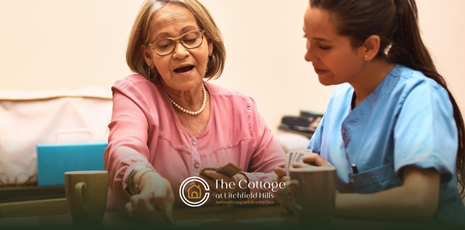How to Celebrate the Holidays with Memory Care Residents

Key Highlights:
- The holidays can still be joyful and meaningful for seniors in memory care with thoughtful planning and familiar traditions.
- Sensory-friendly decorations, music, and meals can help evoke happy memories without overstimulation.
- Family involvement and personalized activities create a sense of belonging and comfort.
- Safety and routine are essential to reduce confusion and maintain a calm, positive atmosphere.
- Small, intentional gestures—like a favorite holiday song or cherished photo—can make a big emotional impact.
The holiday season is a time for family, warmth, and connection. However, for seniors living with Alzheimer’s disease or other forms of dementia, the excitement of the holidays can sometimes bring confusion, agitation, or stress. That doesn’t mean the season can’t be meaningful—it simply calls for thoughtful adjustments and mindful celebration.
If you’re wondering how to celebrate the holidays with memory care residents, this guide provides practical, heartwarming ideas to ensure comfort, joy, and connection during the festive season.
Understanding the Holiday Experience for Memory Care Residents
For those with memory loss, unfamiliar faces, noises, or disruptions in routine can be overwhelming. The key is to balance holiday cheer with familiarity, calm, and routine. Celebrations should be adjusted to fit each resident’s comfort level and cognitive abilities, ensuring that they feel secure and included.
What helps most:
- Familiar sights, sounds, and scents
- Gentle sensory experiences (soft music, warm lighting)
- Maintaining a predictable daily structure
- Involving residents in simple, familiar tasks
1. Create a Calm, Festive Atmosphere
Holiday decorations can bring back wonderful memories—but too much clutter or flashing lights can lead to overstimulation. Aim for a “less is more” approach.
Tips for Decorating Memory Care Spaces:
| Do | Avoid |
|---|---|
| Use soft, warm lighting | Flashing or blinking lights |
| Incorporate natural elements (pine, cinnamon, candles without flame) | Loud holiday inflatables |
| Display a few cherished ornaments or old family photos | Overcrowding rooms with decorations |
| Play familiar carols at low volume | Constant background noise |
Keep decorations consistent in each room so residents don’t get disoriented by frequent visual changes.
2. Encourage Familiar Holiday Traditions
Familiarity helps evoke positive emotions and reduce anxiety. Even if a resident can’t remember every detail, emotional memory—the ability to feel joy from familiar experiences—often remains intact.
Ideas to Revisit Beloved Traditions:
- Baking simple holiday cookies with assistance or supervision
- Listening to favorite carols or hymns from their era
- Watching classic holiday films from the 1950s or 60s
- Decorating a small tree together with safe, soft ornaments
- Reading holiday stories or scriptures aloud
You can also invite family members to share short visits or video calls to rekindle those connections without overwhelming the resident.
3. Engage the Senses with Purposeful Activities
Sensory activities are deeply beneficial for those with dementia, as they can stimulate memory recall and promote relaxation.
Sensory Holiday Activities:
- Touch: Folding holiday napkins, sorting ornaments by color, or handling textured fabrics
- Smell: Cinnamon sticks, pine branches, vanilla candles (flameless), or gingerbread
- Sound: Singing carols together or listening to instrumental versions
- Sight: Watching snowfall or gazing at a softly lit tree
- Taste: Enjoying familiar flavors like peppermint, apple pie, or cocoa
These activities engage multiple senses at once, often sparking comforting emotions and memories.
4. Keep a Consistent Routine
Routine is vital for residents in memory care. Sudden schedule changes can increase confusion or agitation. During the holidays, it’s best to incorporate celebrations into their usual daily structure rather than altering it entirely.
For example:
- Schedule activities during calm parts of the day, such as late morning or early afternoon.
- Keep mealtimes and medication schedules the same.
- Limit large gatherings or loud events to short durations.
The goal is to make the holidays feel special—but still safe and predictable.
5. Involve Family Members Thoughtfully
The holidays are a meaningful time for families, but visits should be short, familiar, and low-stress. Encourage visitors to come in small groups and at calm times of day.
Helpful Tips for Family Visits:
- Bring photo albums or familiar items from home to reminisce together.
- Speak slowly, clearly, and with warmth—even if the resident doesn’t remember names, they respond to tone and emotion.
- Focus on enjoying the moment, not correcting or testing memory.
Family participation can remind residents that they are loved and remembered, even if the details of relationships have faded.
6. Plan Holiday Music Therapy Sessions
Music has a profound effect on memory and mood. Holiday music, in particular, often triggers strong emotional memories.
Consider organizing music therapy sessions that focus on simple sing-alongs or live performances featuring familiar tunes.
Benefits of holiday music therapy:
- Reduces agitation and restlessness
- Encourages participation and communication
- Stimulates memory recall
- Enhances social interaction
If possible, use songs that were popular during the resident’s youth, as these often resonate most deeply.
7. Host Small, Meaningful Gatherings
Instead of large holiday parties, consider smaller gatherings tailored to memory care residents’ comfort levels.
Small Group Celebration Ideas:
- Holiday tea with soft music and festive tableware
- Ornament-making with family photos or name tags
- A “memory tree” where residents and families hang paper ornaments with written blessings or memories
- Watching a classic holiday performance or virtual church service together
These quieter, more intimate settings allow residents to participate comfortably while still feeling the joy of community.
8. Celebrate Through Giving
Many residents feel a renewed sense of purpose when they can contribute. Encourage simple acts of giving, such as:
- Making holiday cards for loved ones or local charities
- Helping wrap small gifts for staff or family
- Writing thank-you notes or signing group cards
Even if the tasks are symbolic, they promote dignity and connection—two essential emotional needs for those in memory care.
9. Incorporate Spiritual or Cultural Traditions
Faith and cultural heritage are powerful sources of comfort and identity. When celebrating the holidays, include familiar spiritual practices or traditions that are meaningful to each resident’s background.
Examples:
- Lighting candles for Hanukkah
- Reading the Nativity story
- Singing traditional hymns
- Saying grace before a meal
Respect each resident’s beliefs and involve family input when possible to ensure authenticity and comfort.
10. Prioritize Safety and Comfort
Safety should always come first in a memory care setting—especially during busy holidays.
Safety Checklist:
- Use battery-operated candles instead of open flames
- Avoid extension cords and cluttered walkways
- Supervise baking and cooking activities
- Keep decorations out of reach if fragile or sharp
- Monitor food allergies and dietary restrictions
A calm, secure environment helps residents enjoy festivities without risk or stress.
11. Capture and Preserve the Moments
Even if a resident may not remember the event later, the joy they feel in the moment matters deeply. Capture these experiences through photos, short videos, or written notes to share with families.
These keepsakes allow families to stay connected and celebrate the resident’s happiness long after the holidays are over.
Creating Joyful, Meaningful Holidays
Celebrating the holidays with memory care residents is about creating moments of connection, not perfection. Even small gestures—a warm smile, a favorite song, or the scent of pine—can bring comfort and joy that linger long after the season ends.
At The Cottage at Litchfield Hills, we embrace this philosophy every day. Our compassionate memory care team ensures each resident enjoys a safe, supportive, and heartwarming holiday experience filled with familiarity, love, and peace. Contact us today!
Frequently Asked Questions
How do you make the holidays less stressful for someone with dementia?
Keep celebrations simple and familiar. Stick to routine, avoid noisy or crowded gatherings, and focus on comforting traditions like music or baking.
Can people with advanced dementia still enjoy the holidays?
Yes. Even if memory is limited, emotional and sensory connections remain strong. Familiar songs, scents, or gentle touch can evoke joy and comfort.
What should I bring when visiting a memory care resident during the holidays?
Bring simple gifts like cozy blankets, framed family photos, or favorite snacks. Avoid items that are loud, breakable, or confusing to use.
How can staff and families work together during the holidays?
Communication is key. Families can share traditions, songs, or recipes that are meaningful to their loved one, helping staff personalize celebrations.
What if a resident becomes agitated during festivities?
Stay calm, redirect gently, and move them to a quieter space. Familiar music, soft lighting, or one-on-one reassurance can help them feel secure again.
Sources:
- https://www.dementiauk.org/information-and-support/health-advice/coping-with-distress/
- https://pmc.ncbi.nlm.nih.gov/articles/PMC8564230/
- https://pmc.ncbi.nlm.nih.gov/articles/PMC5962307/
- https://alzres.biomedcentral.com/articles/10.1186/s13195-023-01214-9






